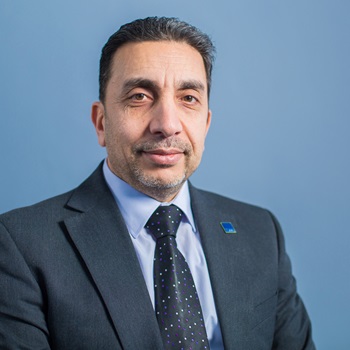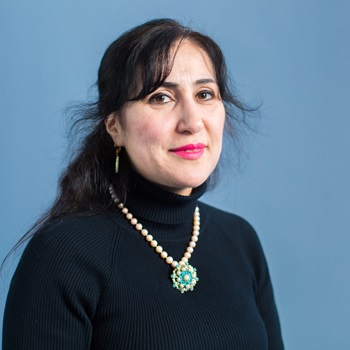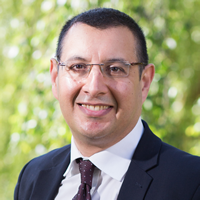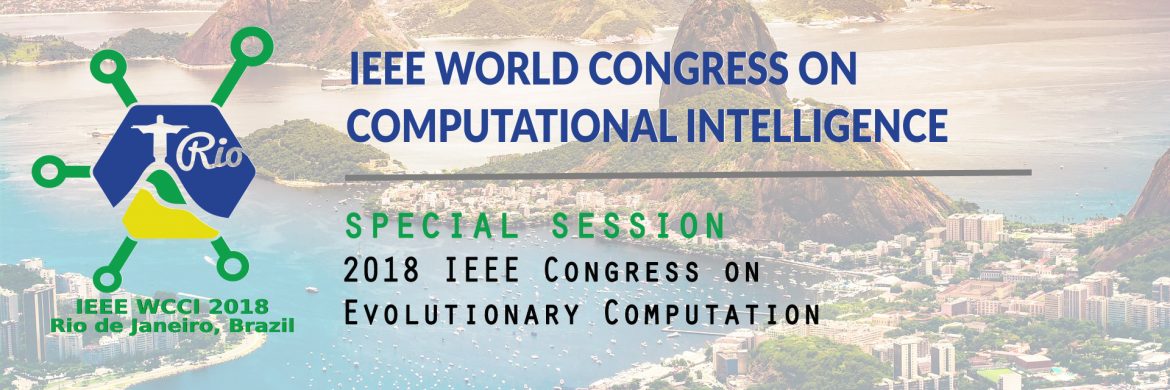IEEE World Congress on Computational Intelligence
IEEE International Conference on Evolutionary Computation
COMPUTATIONAL INTELLIGENCE IN DATA ENGINEERING AND ITS APPLICATIONS TO REAL-WORLD PROBLEMS
Rio de Janeiro, Brazil
July 8-13, 2018
Computational Intelligence (CI), Artificial Intelligence (AI), Data Science and their applications are research areas jointly aligned to benefit research community and society. AI and Data Science encompass a broad field of Computational Intelligence disciplines including data mining, machine learning, ensemble learning, deep learning, fuzzy systems, and evolutionary computation, self-organizing systems and expert systems. In recognition of the escalating importance and relevance of examining the processes and results associated with obtaining and managing data, as well as scrubbing, exploring, modelling, interpreting, communicating and visualising data across all research domains, including Health, Education, Environment, Medicine, Security, Science, Technology, Business, the Humanities and the Arts, the aim of this Special Session is to allow researchers to communicate their high quality, original ideas by presenting and publishing new advances in computational intelligence to data science, engineering, internet of everything, internet of urgent things and their applications.
The world is moving through the fourth industrial revolution, which is happening all around us and affecting and changing the way we live, work and communicate with each other and the other devices around us. Widely used a new generation of artificial intelligence in intelligent medicine, smart city, robotics, intelligent manufacturing, intelligent energy, national defense and other fields will increase the core of computation intelligence and AI industry scale within the next decade. This session is dedicated to researchers and practitioners interested in strategies, theories, practices, and tools, exchanging new theoretical, technical and experimental design. It focuses on CI and AI real-world applications and different use cases of solid findings and insights, best practices and applications to real-life situations, and reviewing new opportunities and frameworks for Data Sciences. This special session brings together CI, AI researchers and practitioners from different scientific disciplines with the goal of fostering collaboration between different and research groups. We aim to increase the understanding and use of AI techniques in the application to real-world problems. We welcome contributions that deal with all aspects of the scientific foundations, theories, techniques and applications of computing, data and analytics, including but not limited to:
Scope
- Internet of Everything and Evolutionary computation
- AI Techniques Applied to Environmental Sciences
- Internet of Urgent things and its applications
- AI Techniques in Support of Aviation and Aerospace Operations
- Intelligent Approaches for Internet of Everything and its application
- Internet of Everything to support Smart Cities
- Computational Intelligence for Clinical Data Analysis
- Machine Learning and its application for Decision Making
- Machine Learning Applications in the Energy Sector
- Deep learning methods for Diagnostic Decision Support
- Novel data processing and analytics, tools and systems
- Advances in Neural networks and its applications
- Fuzzy systems and uncertainty management
- Ensemble learning for Big data mining and knowledge discovery
- Innovative methods for Big data complexity management
- Big Data Engineering
- Evolutionary Inspired Algorithms and Expert Systems
- Biomedical Intelligence, Health Informatics and Intelligent Driven Systems
- Linear and non-linear Learning Approaches
- Advances in Medical Image and Signal Processing
Submissions
Papers should be submitted following the template instructions that are available on the IEEE WCCI 2018 website here. Paper submission instructions and important dates are available here. Papers should be uploaded using the IEEE CEC submission link which can be found here. Please select the main research topic as Special Session; “Special Session on Computational Intelligence to Data Engineering and Its’ Applications to Real-World Problems.“. Accepted papers will be included and published in the conference proceedings.
Important Dates
| Submission of Papers | 1st February 2018 (Extended) |
| Notification of Acceptance | 15th March 2018 |
| Final Submission | 1st May 2018 |
| Early Registration | 1st May 2018 |
Organisers
Dhiya Al-Jumeiy, Liverpool John Moores University, UK (d.aljumeily@ljmu.ac.uk)
 Professor Dhiya Al-Jumeily is a professor of Artificial Intelligence and the Associate Dean of External Engagement for the Faculty of Engineering and Technology. He has extensive research interests covering a wide variety of interdisciplinary perspectives concerning the theory and practice of Applied Computing in medicine, human biology, and health care. He has published well over 170 peer-reviewed scientific publications, 6 books and 5 book chapters, in multidisciplinary research areas including: Technology Enhanced Learning, Applied Artificial Intelligence, Neural Networks, Signal Prediction, Telecommunication Fraud Detection, AI-based clinical decision-making, medical knowledge engineering, Human-Machine Interaction, intelligent medical information systems, wearable and intelligent devices and instruments. But his current research passion is decision support systems for self-management of health and disease.Dhiya has successfully supervised 16 PhD students’ studies and has been an external examiner to various UK and overseas Universities for undergraduate, postgraduate and research degrees. He has been actively involved as a member of editorial board and review committee for a number peer-reviewed international journals, and is on program committee or as a general chair for a number of international conferences.
Professor Dhiya Al-Jumeily is a professor of Artificial Intelligence and the Associate Dean of External Engagement for the Faculty of Engineering and Technology. He has extensive research interests covering a wide variety of interdisciplinary perspectives concerning the theory and practice of Applied Computing in medicine, human biology, and health care. He has published well over 170 peer-reviewed scientific publications, 6 books and 5 book chapters, in multidisciplinary research areas including: Technology Enhanced Learning, Applied Artificial Intelligence, Neural Networks, Signal Prediction, Telecommunication Fraud Detection, AI-based clinical decision-making, medical knowledge engineering, Human-Machine Interaction, intelligent medical information systems, wearable and intelligent devices and instruments. But his current research passion is decision support systems for self-management of health and disease.Dhiya has successfully supervised 16 PhD students’ studies and has been an external examiner to various UK and overseas Universities for undergraduate, postgraduate and research degrees. He has been actively involved as a member of editorial board and review committee for a number peer-reviewed international journals, and is on program committee or as a general chair for a number of international conferences.
Dhiya is also a successful entrepreneur. He is the head of enterprise for the faculty of Engineering and Technology. He has been awarded various commercial and research grants, nationally and internationally, over £3M from Overseas Research and Educational Partners, UK through British Council and directly from industry with a portfolio of various Knowledge Transfer Programmes between academia and Industry. Dhiya has extensive leadership experience including the Development and Management of the Professional Doctorate programme in Engineering and Technology for the University, a founder and Chair of the IEEE International Conference Series on Developments in eSystems Engineering DeSE (www.dese.org.uk) since 2007. He has a large number of international contacts and leads or participates in several international committees in his research fields. Dhiya has one patent and coordinated over 10 projects at national and international level.
Prof. Al-Jumeily is a Senior Member of the IEEE and a Chartered IT Professional. He is also a fellow of the UK Higher Education Academy.
Abir Hussain, Liverpool John Moores University, UK (A.hussain@ljmu.ac.uk)
 Dr. Abir Hussain is a Reader (Associate Professor) in Image and Signal Processing and she is the head of the Applied Computing Research Group at the faculty of Engineering and Technology. She completed her PhD study at The University of Manchester, UK in 2000 with a thesis title Polynomial Neural Networks for Image and Signal Processing. She has published numerous referred research papers in conferences and Journal in the research areas of Neural Networks, Signal Prediction, Telecommunication Fraud Detection and Image Compression. She has worked with higher order and recurrent neural networks and their applications to financial, physical, e-health and image compression techniques. She has developed with her research students a number of recurrent neural network architectures. Her research has been published in a number of highly esteemed and high impact journals such as the Expert Systems with Applications, PloS ONE, Electronic Letters, Neurocomputing, and Neural Networks and Applications. She is a PhD supervisor and an external examiner for research degrees including PhD and MPhil. She is one of the initiators and chairs of the Development in e-Systems Engineering (DeSE) series, most notably illustrated by the IEEE technically sponsored DeSE International Conference Series
Dr. Abir Hussain is a Reader (Associate Professor) in Image and Signal Processing and she is the head of the Applied Computing Research Group at the faculty of Engineering and Technology. She completed her PhD study at The University of Manchester, UK in 2000 with a thesis title Polynomial Neural Networks for Image and Signal Processing. She has published numerous referred research papers in conferences and Journal in the research areas of Neural Networks, Signal Prediction, Telecommunication Fraud Detection and Image Compression. She has worked with higher order and recurrent neural networks and their applications to financial, physical, e-health and image compression techniques. She has developed with her research students a number of recurrent neural network architectures. Her research has been published in a number of highly esteemed and high impact journals such as the Expert Systems with Applications, PloS ONE, Electronic Letters, Neurocomputing, and Neural Networks and Applications. She is a PhD supervisor and an external examiner for research degrees including PhD and MPhil. She is one of the initiators and chairs of the Development in e-Systems Engineering (DeSE) series, most notably illustrated by the IEEE technically sponsored DeSE International Conference Series
Hissam Tawfik, Leeds Beckett University, UK (H.Tawfik@leedsbeckett.ac.uk)
 Professor Hissam Tawfik is a Professor of Computer Science with research expertise and interests in the areas of Biologically Inspired Computing, Applied Data Science, and Intelligent Systems and E-Health. He holds a PhD in Computer Engineering from the University of Manchester (then UMIST) and has been actively publishing in international journals since 1998. Hissam has a research track record of more than 120 refereed publications in reputable international journals and conference proceedings such as the IEEE Transactions on IT in BioMedicine, IET Communications, Advanced Engineering Informatics, Ad Hoc Networks and Computer and Network Applications.
Professor Hissam Tawfik is a Professor of Computer Science with research expertise and interests in the areas of Biologically Inspired Computing, Applied Data Science, and Intelligent Systems and E-Health. He holds a PhD in Computer Engineering from the University of Manchester (then UMIST) and has been actively publishing in international journals since 1998. Hissam has a research track record of more than 120 refereed publications in reputable international journals and conference proceedings such as the IEEE Transactions on IT in BioMedicine, IET Communications, Advanced Engineering Informatics, Ad Hoc Networks and Computer and Network Applications.
Hissam Tawfik is an editor of the International Journal of Future Generation Computer Systems (Elsevier) and the International Journal of Neural Computing and Applications (Springer), and a guest editor of the International Journal of Medical Informatics (Elsevier). He is a visiting Professor at the University of Seville (Spain) and is a chair of the International Conference Series on Developments in eSystems Engineering (DESE). Before joining Leeds Beckett University in 2015, Hissam worked for University of Salford and Liverpool Hope University.
Jamila Mustafina, Kazan Federal University, Russia (DNMustafina@kpfu.ru)
 Professor Jamila Mustafinа is the Head of the “Innovation and Technology in Education and Communication” research lab in Kazan Federal University, Russia. She received her PhD in 2007 and full professorship in 2012. Her scientific interests cover the technology-enhanced learning, learning analytics as well as sociolinguistic studies; particularly in the protection of minority languages in the globalized world. A special area of her research is the interdisciplinary approach towards the improvement of the social spheres of human life using technology and applied computing. Jamila has published over 70 peer-reviewed scientific articles, 4 books, 2 book chapters. She is currently supervising 5 PhD students and 2 post-docs. She is also acting as a deputy editor-in-chief of the peer-reviewed scientific journal “Education and Self Development”. Jamila has been awarded a number of research grants nationally and internationally.
Professor Jamila Mustafinа is the Head of the “Innovation and Technology in Education and Communication” research lab in Kazan Federal University, Russia. She received her PhD in 2007 and full professorship in 2012. Her scientific interests cover the technology-enhanced learning, learning analytics as well as sociolinguistic studies; particularly in the protection of minority languages in the globalized world. A special area of her research is the interdisciplinary approach towards the improvement of the social spheres of human life using technology and applied computing. Jamila has published over 70 peer-reviewed scientific articles, 4 books, 2 book chapters. She is currently supervising 5 PhD students and 2 post-docs. She is also acting as a deputy editor-in-chief of the peer-reviewed scientific journal “Education and Self Development”. Jamila has been awarded a number of research grants nationally and internationally.

